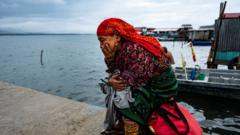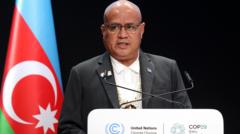As COP29 talks extend into the weekend, developing nations have rejected offers of climate funding, calling for more substantial commitments to address their pressing needs in combating climate change.
COP29 Talks Extended Amid Discontent Over Climate Financing

COP29 Talks Extended Amid Discontent Over Climate Financing
High tensions as poorer nations express frustration over climate financial commitments.
In Baku, the COP29 climate conference has entered a contentious phase as a significant divide emerges between wealthier and poorer nations over climate financing. Rich nations proposed increasing annual financial support for developing countries to $250 billion, a figure that has been met with sharp criticism from representatives of those nations, who insist the amount is insufficient given their urgent needs.
Delegates from low-lying island states, like the Marshall Islands, have expressed "deep disappointment" towards the offered sum, stressing that it demonstrates a disregard for vulnerable populations facing climate crises. The need for comprehensive support—estimated at $1.3 trillion by 2035—has been underscored, as developing nations prepare to shoulder increasingly severe impacts of climate change.
Over the course of the negotiations, wealthier nations have struggled to finalize their financial commitments amid economic pressures at home, making it more challenging to gather the necessary funds for effective climate action. The discussions are particularly fraught as the deadline looms, with no resolution yet in sight.
A US official acknowledged the significant challenge ahead in achieving the proposed $250 billion target, but responses from representatives of affected countries indicate that these discussions require more substantial outcomes than mere offers of economic aid. As the final hours of negotiations approach, the situation remains fluid, with developed countries continuing to grapple with their own energy policies and commitments to carbon reduction.
As talks push through the night, the outcome will dictate not just financial promises, but also the real progress on global commitments to combat the next wave of climate challenges.
Delegates from low-lying island states, like the Marshall Islands, have expressed "deep disappointment" towards the offered sum, stressing that it demonstrates a disregard for vulnerable populations facing climate crises. The need for comprehensive support—estimated at $1.3 trillion by 2035—has been underscored, as developing nations prepare to shoulder increasingly severe impacts of climate change.
Over the course of the negotiations, wealthier nations have struggled to finalize their financial commitments amid economic pressures at home, making it more challenging to gather the necessary funds for effective climate action. The discussions are particularly fraught as the deadline looms, with no resolution yet in sight.
A US official acknowledged the significant challenge ahead in achieving the proposed $250 billion target, but responses from representatives of affected countries indicate that these discussions require more substantial outcomes than mere offers of economic aid. As the final hours of negotiations approach, the situation remains fluid, with developed countries continuing to grapple with their own energy policies and commitments to carbon reduction.
As talks push through the night, the outcome will dictate not just financial promises, but also the real progress on global commitments to combat the next wave of climate challenges.






















